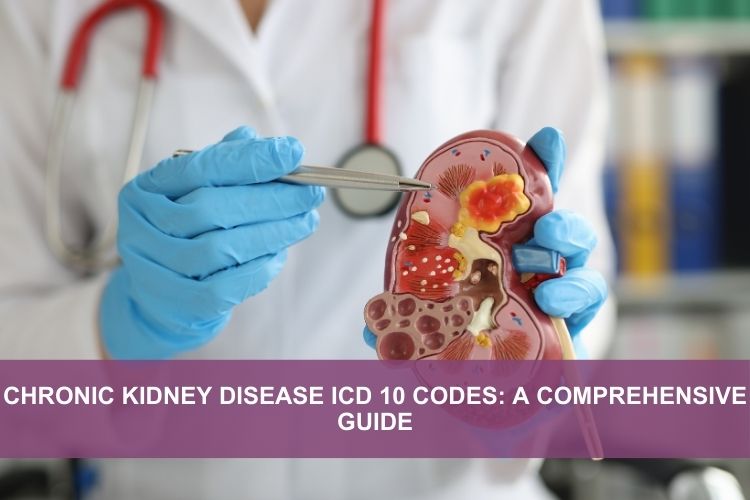Chronic kidney disease affects approximately 37 million people in the United States who are at high risk of illnesses such as diabetes and hypertension. This condition can cause major problems, such as kidney failure. Recognizing and classifying it correctly with ICD-10 codes leads to better treatment plans. This method helps in making improved clinical choices and guarantees appropriate reimbursement.
Chronic renal insufficiency ICD-10 significantly impacts patient care and overall healthcare quality. Each stage has a unique code that might affect clinical outcomes and overall patient care. End-stage renal disease is not often diagnosed early. This article will help you understand the ICD-10 codes for every stage of CKD. It also includes important codes for related issues like anemia and useful tips to prevent common coding mistakes.
How Many Stages of Chronic Renal Disease are Described in ICD-10?
Chronic renal insufficiency ICD-10 is critical for correct diagnosis, effective treatment planning, and proper billing. There are five stages including End-Stage Renal Disease.
| CKD Stage | GFR Range | ICD-10 Code | Description |
| Stage 1 | 90+ | N18.1 | If kidney function seems normal or high but shows signs of damage, such as in urine protein, must monitor it closely. |
| Stage 2 | 60-89 | N18.2 | Mildly damaged kidney function, with potential structural problems. Controlling blood pressure and risk factors are among the management strategies. |
| Stage 3a | 45-59 | N18.31 | Kidney function decreases slowly to moderately. It monitors the issues such as anemia. |
| Stage 3b | 30-44 | N18.32 | Kidney function is decreased from moderate to severe levels. Must focus on stopping further reduced health issues and keeping track of GFR. |
| Stage 4 | 15-29 | N18.4 | Renal function falls off significantly at this stage. Must prepare for dialysis or a transplant to help minimize complications. |
| Stage 5 | <15 | N18.5 | Advanced renal failure needs dialysis or transplantation. Should focus on treatment symptom control and preparation for renal replacement therapy. |
| End-Stage Renal Disease | Complete loss | N18.6 | ESRD needs continuing dialysis or kidney transplantation. Accurate coding allows for proper care coordination and billing. |
Coding Disorders in Abnormal Kidney Function ICD-10
Accurate classification of comorbidities in Chronic Kidney Disease (CKD) is critical for best diagnosis and therapy planning. We present crucial coding techniques for hypertension, diabetes, and anemia in CKD patients.
| Category | Details |
| Topic | Hypertension and CKD |
| Description | When classifying CKD and hypertension shared, unique codes are required to indicate the combined impact on kidney health. |
| ICD-10 Codes | Use codes from the I12.- series for hypertensive CKD, incorporating the CKD stage (N18.-). |
| Examples | 12.0 is used for hypertensive chronic kidney disease (CKD) stages 1 to 412.9 is used for hypertensive chronic kidney disease with an unknown CKD stage. |
| Key Points | List the hypertensive CKD code first to ensure the correct order.Use the correct CKD stage code to show the patient’s condition clearly. |
| Category | Details |
| Topic | Diabetes and CKD |
| Description | Diabetes is a major cause of CKD, and proper coding is critical for controlling and tracking disease progression. |
| ICD-10 Codes | E11.22 for Type 2 diabetes with CKD, for the specific CKD stage code (N18.1-N18.6). |
| Key Points | Always mention the CKD stage when you can.Do not use the CKD code (N18.9) if you know the stage.Correctly coding both conditions is essential for effective patient care. |
| Category | Details |
| Topic | Anemia in CKD |
| Description | Anemia often occurs in patients with chronic kidney disease (CKD) because their bodies produce less erythropoietin. |
| ICD-10 Codes | D63.1 is used for anemia in chronic kidney disease (CKD). Code N18.- is used for the CKD stage. |
| Key Points | Always start by coding the CKD stage, then code D63.1.This order clearly shows the main issue and its concern problems for effective management. |
Conclusion
Correct classification of Chronic Kidney Disease (CKD) using ICD-10 codes is critical for accurate diagnosis, appropriate treatment planning, and management of related illnesses such as hypertension, diabetes, and anemia. Understanding the ICD-10 codes for each stage of CKD-related disorders such as decreased GFR and abnormal kidney function tests, enables healthcare personnel to provide precise, patient-centered therapy. Precise coding methods improve clinical outcomes, guarantee proper billing, and improve care quality for CKD patients. Accurate coding is critical for improving patient care and optimizing healthcare resource utilization and payment processes.
FAQs
1. What are the ICD-10 codes for each stage of Chronic Kidney Disease (CKD)?
The ICD-10 codes for CKD stages range from N18.1 for Stage 1 to N18.6 for End-Stage Renal Disease (ESRD). Each code corresponds to the severity of the kidney function decline.
2. How many stages of CKD are described in ICD-10?
There are five stages of CKD described in ICD-10, plus End-Stage Renal Disease (ESRD). Each stage has its specific code that reflects the level of kidney function.
3. Why is accurate coding of CKD important for healthcare providers?
Accurate coding of CKD is crucial for proper diagnosis, effective treatment planning, and appropriate billing. It ensures that the severity of the condition is correctly documented, which directly impacts patient care and reimbursement.
4. How should CKD be coded when comorbidities like hypertension and diabetes are present?
For CKD with hypertension, use codes from the I12 series along with the appropriate CKD stage code. For CKD with diabetes, use E11.22 with the specific CKD stage code (N18.1-N18.6). Proper sequencing is essential to accurately represent the patient’s condition.
5. What ICD-10 code should be used for abnormal kidney function test results?
Use ICD-10 code R94.4 for abnormal kidney function studies. This code should be paired with the specific CKD stage code (N18.-) to provide a comprehensive view of the patient’s kidney health.



